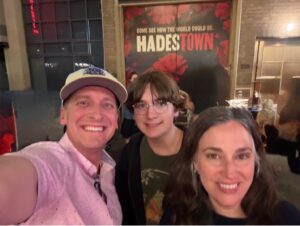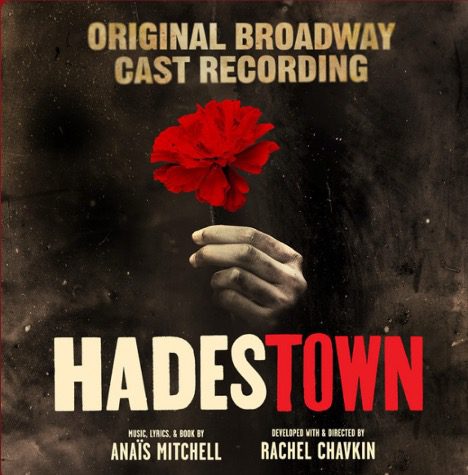Welcome to Friday 411, issue #120. In 4 minutes, with 1 insight and 1 action, you’ll choose the kind of leader you want to be.
1 Insight
Some leaders use power to control people. Others use vision to free them. Only one kind becomes a hero.
We both love a night at the theater. Not only do we have season tickets to the Broadway series at the Tennessee Theater in our hometown of Knoxville, TN, but we also work frequently in New York City and try to grab a show each time we’re there. Musicals combine storytelling, music, emotion, and (let’s be honest) wildly overpriced beverages.
The first time we saw the brilliant musical, Hadestown by Anaïs Mitchell, we did not know what to expect. We ended up shedding more than a few tears — the sign of a powerful story.
The story and music gripped us to the point that we introduced our kids to the soundtrack. For the last 18 months, we’ve been singing along to the songs when we clean up the kitchen together after dinner.
A few weeks ago, we traveled to NYC for work and fun and took our youngest to Hadestown, lucking out with fantastic spit-zone seats. This time, up close, something struck us: while Hadestown is a retelling of an old Greek myth, it’s also a parable about two different kinds of leaders.

If you’ve never seen the show, don’t worry—we won’t spoil the ending. More importantly, you don’t have to love Broadway to apply these leadership insights. (And for those of you who have attended some of our trainings, you’re probably breathing a sigh of relief that we’re sharing leadership lessons from a musical other than Hamilton.)
The “CliffsNotes” to Hadestown
The story of Hadestown is narrated by Hermes, the messenger of the gods.
Hades rules the underworld (a.k.a Hadestown) by building factories and electric grids. His wife, Persephone — goddess of spring — stays trapped in the underworld half of the year. Hades allows her to return above ground to usher in spring and summer. However, Hades cares for her so much that he extends her time with him. This leaves the world bleak and broken.
Orpheus is a poor but gifted musician. He is working on a magical song that will bring the “world back into tune” and make spring come again despite Persephone’s absence. He falls in love with Eurydice, a weary and practical young woman trying to survive. The two profess their commitment to one another, but Orpheus disappears to finish his song.
As hunger and hardship grow, Eurydice is lured into Hadestown. Hades offers her safety and food if she signs a contract to work for him. She agrees, believing that she’s gaining comfort, when, in fact, she’s become a slave to Hades.
When Orpheus completes the song, he realizes Eurydice is gone, so he delves into the underworld to find her. He begs for her release, but Hades initially refuses because he “owns” Eurydice.
The Story of Two Leaders
Hadestown is the tale of two leaders who have a different philosophy on how to influence people.
Hades
While he once believed in love and beauty, Hades traded vulnerability for control. You learn this in Chant Reprise:
“Young man! I was young once too
Sang a song of love like you
Now I sing a different song
One I can depend upon
A simple tune, a steady beat
The music of machinery.”
Now, he takes advantage of people’s weaknesses and difficult life circumstances to gain more power for himself. He promises people that he will free them and make them safe when he actually enslaves them. They repeat this chilling mantra:
“You gotta keep your head low
If you wanna keep your head.”
Hades has positional power that he uses to create fear and compliance. The longer people work for him, the more their lives shrivel until he discards them.
Orpheus
Contrast this with young Orpheus. He has no authority, title, or army. But Hermes tell us that Orpheus has a gift:
“He could make you see how the world could be
In spite of the way that it is.”
Orpheus’s gift is known as vision. It’s the one thing that a leader must have: the ability to see a clear, preferred, and desired future, gather others around that future, and mobilize others to create that future.
Orpheus sings hope into hopeless places. He calls people not to obey because of his power but to believe because of his vision.
When he finds out that Hades owns Eurydice, Orpheus grows despondent. Through the song If It’s True, he laments the hopelessness of the situation:
If it’s true what they say
If there’s nothing to be done
If it’s true that it’s too late
And the girl I love is gone
If it’s true what they say
Is this how the world is?
To be beaten and betrayed
And then be told that nothing changes
It’ll always be like this
If it’s true what they say
I’ll be on my way.”
Orpheus nearly gives up. But as he sings, the workers imprisoned in Hadestown begin to hope again. They listen and stand with him. Their belief in his vision reinvigorates his own belief in a better world. He sings.
“I believe we’re stronger than they know.
I believe that we are many.
I believe that they are few.
And it isn’t for the few
To tell the many what is true.”
If it’s true what they say
I’ll be on my way
But who are they to say
What the truth is anyway?
Leadership that Frees People
This is the kind of leadership the world needs: not more power, control, and manipulation. Not more demands for compliance and dehumanizing treatment.
We need leaders like Orpheus — like you — who can see the world as it could be, in spite of the way that it is. We need leaders who invite others into that vision and make others more fully alive because of it.
The world needs you to help people believe in a better world.
1 Action
Ask yourself: “Do I lead more like Hades or Orpheus?” This week, name one area where you’ve used control instead of vision. Take one step toward becoming the kind of leader who helps people stand up, look up, and walk free.
Want to listen to Hadestown?


